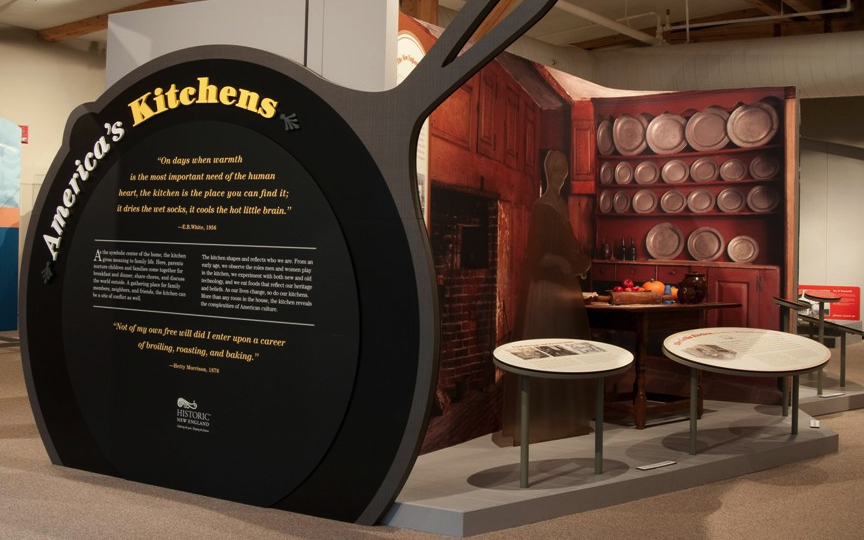I am a sucker for old stuff. Buildings, art, furniture, books, anything with a history of its own. So when I read about a new exhibit opening at the Saco Museum, I knew I’d have to see it, pronto!
exhibits
America’s Kitchens (and the women who shaped them)

Back in January, I went to the New Hampshire Historical Society to take in a long-awaited exhibit called America’s Kitchens.
Sponsored by Historic New England, this exhibit covered the entire history of the kitchen in this country, as well as recipes, cooking techniques, and most importantly, the role/s of women in these important chores. Although fairly small in scale, it featured not only print materials, but some fascinating antiques, a vintage 50s kitchen complete with appliances, and even a few hands-on displays. As a real foodie, I’d gone into the exhibit thinking this glimpse into the past would be pure entertainment. But it left me grappling with my own ignorance. Although I can recollect recounted snippets of my great grandmother’s and my grandmother’s childhood chores, they’re fuzzy at best. As a modern woman, I have never known the kitchen as anything but fun. This exhibit reminded me that until very recent times, the kitchen was anything but.
Historically, cooking and kitchen work fell principally if not solely to females, and before the advent of today’s convenience technologies, the preparation, storage and keeping of food, and all associated & very necessary cleaning tasks were nothing short of grueling. It’s one thing today to make a choice to cook or clean, but back in the day, women (unless they were wealthy) had NO CHOICE. Sun up to sun down was devoted to maintaining fires, tending to livestock, working fields, preparing food, feeding families, raising children – and by raising I mean everything involved with their upbringing, be it nursing, changing, teaching, playing, and so on. All day long there was cleaning to be done, not to mention seasonal activities, like canning, pickling, the smoking and salting of meats, butter making, and more. And let’s not forget other important tasks like the making and mending of clothes, along with their maintenance. Laundry alone would take hours of backbreaking labor. The Whirlpool Corporation (well, technically its predecessor) wasn’t even founded until 1911!!
Women Worked (with a capital W) all day, every day, until they finally dropped dead of exhaustion. Rarely was there expectation of eventual betterment or any other role to fill.
Home life for our predecessors was more than thankless; it was mandatory indentured servitude. No wonder women were so eager to escape! The kitchen was and is the heart of the home, but historically it was also a place of undeniable struggle. Against hunger, against nature, and against gender roles. While some women embraced their expected place, you can understand why others railed against it. Choice, my friends, can make even unappealing tasks palatable. Which brings me to another interesting point raised by the exhibit. When American housewives had the finance and good fortune to pass their labor onto others, they happily did so, in the form of paid servants and unpaid slaves. Interesting to note how often these unburdened women were quick to complain about the poor performance of those toiling on their behalf.
Many modern women, such as yours truly, complain about having to do simple household chores. We gripe about having to push a vacuum across the floor or wipe down counters with magical germ killing cleaners. We grudgingly toss clothes into big shiny machines which do ALL THE WORK FOR US. In comparison to what our forebears had to slog through daily, we’re a bunch of pampered pansies. But even now, some women struggle just as they always have. They wash clothes by hand in filthy streams, they draw water from wells, carrying it miles back to their homes – often with their children in tow. Women are still scraping by, cooking meager food, making clothes by hand, even here in America. Fortunately, most of us reading this have a choice. Whether you love or hate the kitchen, you’re not bound to it. In 2010, women have the luxury of opting out of cooking altogether if they so desire, and some do.
I have been thinking about this exhibit a lot lately, not only because I recently finished reading the excellent accompanying book, but because of my own life circumstance. I am someone who loves the kitchen, but who is forced to cook out of necessity. When I was diagnosed with Meniere’s Disease and told I’d have to give up salt, I traded freedom for health. Living in a 250 year old home, and spending hours each day in my modern-yet-historic kitchen
I wonder about the women who used to work in these walls. I envision them laboring in front of the open hearth, baking bread in the beehive oven, having to constantly maintain the fire. How exhausting it must all have been. It makes me further appreciate all of the advantages I do have, circa 2010. Like my beautiful new appliances! Which do EVERYTHING FOR ME, including cool, cook and clean.. God bless them.



